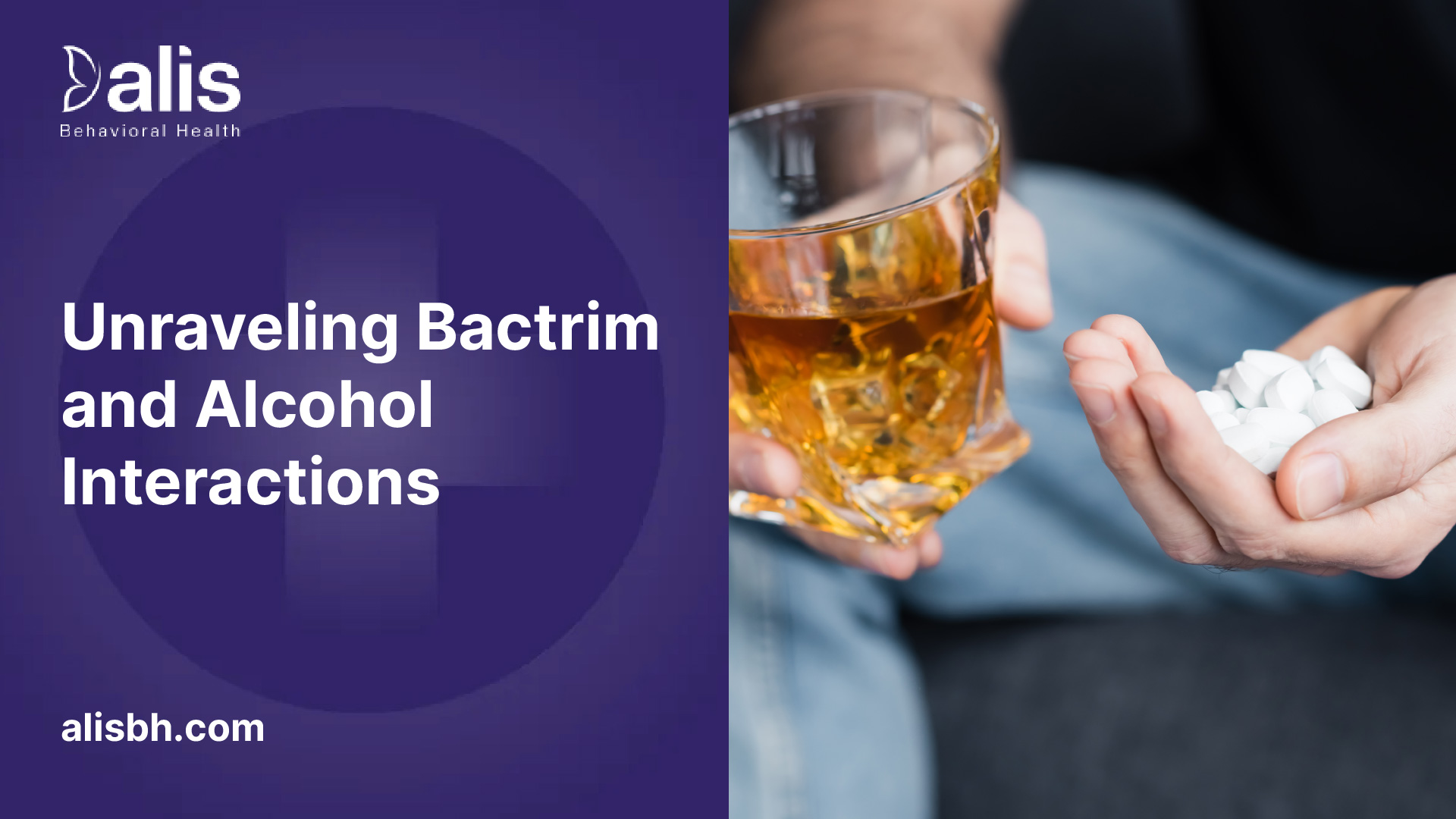
Understanding Bactrim and Alcohol Interaction
When it comes to taking medications, it’s important to be aware of any potential interactions with other substances, including alcohol. This holds true for Bactrim, an antibiotic commonly prescribed to treat bacterial infections. Mixing Bactrim with alcohol can pose risks and have an impact on liver function.
Risks of Mixing Bactrim with Alcohol
The combination of Bactrim and alcohol can lead to severe reactions, even with small amounts of alcohol. These reactions may include flushing, headache, nausea, vomiting, and rapid heart rate. It is generally not recommended to consume alcohol while taking Bactrim, as it can interfere with the effectiveness of the medication and increase the risk of side effects.

Impact on Liver Function
Bactrim and alcohol can have a negative impact on liver function. Combining these substances may lead to liver damage, jaundice, and blood disorders. The liver is responsible for metabolizing both Bactrim and alcohol, and the simultaneous presence of these substances can put additional stress on this vital organ. It is important to consult with a healthcare professional before consuming alcohol while taking Bactrim to assess any potential risks and ensure the well-being of your liver.
Understanding the risks associated with mixing Bactrim and alcohol is crucial for maintaining your health and optimizing the effectiveness of the medication. It is advised to avoid alcohol consumption while taking Bactrim to prevent adverse reactions, minimize liver damage potential, and ensure the proper treatment of bacterial infections. Always consult with your healthcare provider for personalized advice regarding the use of Bactrim and alcohol.
Precautions and Considerations
When it comes to the interaction between Bactrim and alcohol, certain precautions and considerations should be taken to ensure your safety and avoid any potential risks.
Avoiding Alcohol with Bactrim
It is strongly advised to avoid consuming alcohol while taking Bactrim. Mixing Bactrim with alcohol can lead to severe reactions, including flushing, headache, nausea, vomiting, and rapid heart rate, even with small amounts of alcohol [1]. These reactions can occur due to the interference of alcohol with the way Bactrim is metabolized in the body, potentially intensifying its side effects. Therefore, it’s crucial to refrain from alcohol consumption while undergoing treatment with Bactrim.
Importance of Medical Advice
Before starting any medication, including Bactrim, it is always essential to consult with a healthcare professional. Informing your doctor about your alcohol consumption patterns, including alcoholism, is crucial for their accurate assessment of potential risks and interactions. They can provide personalized advice based on your specific situation and guide you on the potential risks associated with combining Bactrim and alcohol.
Your healthcare provider may recommend a waiting period after taking Bactrim before consuming alcohol. Generally, it is advised to wait at least 24 hours after taking Bactrim before drinking alcohol to reduce the risk of side effects. However, individual factors such as overall health, dosage of Bactrim, and frequency of alcohol consumption can affect the associated risks. Therefore, it is crucial to follow the guidance of your healthcare provider for the appropriate waiting period.
In conclusion, it is best to avoid alcohol consumption while taking Bactrim to optimize the absorption and effectiveness of the medication, as well as to prevent potentially severe reactions. Seeking advice from a healthcare professional is crucial to ensure your safety and receive personalized guidance based on your specific circumstances.
Side Effects and Symptoms
When Bactrim, an antibiotic medication, is combined with alcohol, it can lead to various side effects and symptoms. It is important to be aware of these potential interactions to avoid any negative health consequences.
Disulfiram-Like Reaction
One of the significant risks of mixing Bactrim with alcohol is the occurrence of a disulfiram-like reaction. This reaction is named after the medication disulfiram, commonly used in the treatment of alcoholism. The reaction causes symptoms such as nausea, vomiting, flushing, and a fast heartbeat. It occurs because Bactrim can interfere with how the liver breaks down alcohol, making it harder for the body to eliminate it.
The symptoms of a disulfiram-like reaction can be uncomfortable and distressing. It is essential to avoid alcohol consumption while taking Bactrim to minimize the risk of experiencing these unpleasant effects.
Gastrointestinal Distress
Mixing Bactrim with alcohol can also lead to gastrointestinal distress. This can manifest as symptoms such as nausea, vomiting, and stomach discomfort. The combination of Bactrim and alcohol can put additional strain on the digestive system, leading to these unpleasant effects.
Experiencing gastrointestinal distress can be uncomfortable and may disrupt daily activities. To prevent these symptoms, it is crucial to refrain from consuming alcohol while taking Bactrim.
It is important to note that the interaction between Bactrim and alcohol can have serious consequences. These can range from mild discomfort to more severe side effects. Therefore, it is strongly advised to avoid alcohol completely while taking Bactrim to ensure your safety and well-being.
Remember, always consult with your healthcare provider for personalized advice regarding the use of Bactrim and the potential interactions with alcohol.
Recovery and Immune System
When it comes to the interaction between Bactrim and alcohol, it’s important to consider the impact on recovery and the immune system. Alcohol consumption can have detrimental effects on the body’s ability to heal and fight off infections.
Alcohol’s Effect on Recovery
Alcohol makes it harder for the body to recover from illness, as it can interfere with various bodily processes. When combined with Bactrim, which can already cause side effects like nausea, vomiting, and diarrhea, alcohol can exacerbate these symptoms. Additionally, heavy drinking, defined as over 8 drinks per week for women and more than 15 drinks per week for men, further weakens the immune system, making it more difficult for the body to combat infections and recover effectively.
Immune System Compromise
Alcohol consumption can significantly weaken the immune system, making it more challenging for the body to fight off infections, especially when combined with Bactrim. The immune system plays a crucial role in defending the body against harmful bacteria and viruses. When alcohol compromises the immune system, it becomes harder for the body to combat infections, potentially prolonging the illness and hindering the healing process [2]. Furthermore, mixing alcohol with Bactrim may increase the risk of developing antibiotic resistance, which can have implications for future treatment options.
It is essential to prioritize the healing process and support the immune system when taking Bactrim. This means avoiding alcohol consumption to ensure the effectiveness of the medication, minimize the risk of side effects, and promote a speedy recovery. It is always advisable to consult with a healthcare professional for personalized medical advice regarding the use of Bactrim and alcohol.
Risks and Complications
When it comes to the interaction between Bactrim and alcohol, there are potential risks and complications that individuals should be aware of. It is important to note that Bactrim should not be used in certain circumstances, such as severe liver disease, unmonitored kidney disease, anemia caused by folic acid deficiency, the use of dofetilide, or a history of low platelets caused by trimethoprim or a sulfa drug.
Liver Damage Potential
Combining alcohol with Bactrim can have detrimental effects on the liver. Alcohol and Bactrim both exert stress on the liver individually, and when used together, they can further burden the liver. Bactrim can interfere with the liver’s ability to break down alcohol, making it harder for the body to clear alcohol from the system. This can lead to a “disulfiram-like reaction,” which may cause symptoms such as nausea, vomiting, flushing, low blood pressure, or a fast heartbeat. The liver plays a vital role in metabolizing substances in the body, including medications like Bactrim, and excessive alcohol consumption can further compromise the liver’s function. Therefore, combining alcohol with Bactrim puts individuals at an increased risk of liver damage.
Serious Adverse Effects
The combination of alcohol and Bactrim can lead to serious adverse effects. When alcohol is consumed while taking Bactrim, it can intensify the side effects of both substances. These effects may include nausea, vomiting, rapid heartbeat, and even shortness of breath. Additionally, a disulfiram-like reaction can occur, resulting in symptoms such as nausea, vomiting, flushing, and a fast heartbeat. Serious side effects have been reported from this combination, making it crucial to avoid alcohol while taking Bactrim.
To ensure the effectiveness of Bactrim and minimize the risk of complications, it is strongly recommended to avoid alcohol consumption while taking the medication. Alcohol can interfere with the body’s ability to properly metabolize and absorb Bactrim, potentially reducing its effectiveness in treating bacterial infections. Prioritizing the health and well-being of individuals is paramount, and abstaining from alcohol while taking Bactrim is an important precautionary measure.
Post-Bactrim Alcohol Consumption
After completing a course of Bactrim (sulfamethoxazole/trimethoprim), it’s important to exercise caution when it comes to consuming alcohol. The interaction between Bactrim and alcohol can lead to various complications and undesirable effects. In this section, we will discuss the recommended waiting period before consuming alcohol and how to manage any potential side effects.
Waiting Period Recommendation
To ensure the safety and effectiveness of the medication, it is generally advised to wait at least 48 hours (2 days) after the last dose of Bactrim before consuming any alcoholic beverages. This waiting period is necessary because Bactrim interferes with the liver’s ability to break down alcohol, making it harder for the body to eliminate alcohol from the system.
During this waiting period, it’s important to prioritize hydration and allow your body to fully process and eliminate the medication. It is also advisable to follow any specific instructions provided by your healthcare provider regarding the use of alcohol after completing a course of Bactrim.
Managing Side Effects
Combining alcohol with Bactrim can result in a disulfiram-like reaction, which can cause symptoms such as nausea, vomiting, flushing, and a fast heartbeat. This reaction occurs because Bactrim can prevent the liver from adequately breaking down alcohol, leading to an accumulation of toxic byproducts in the body.
To manage potential side effects, it is essential to avoid consuming alcohol while taking Bactrim and during the waiting period after completing the medication. If you experience any adverse symptoms, it is important to seek medical attention immediately. Your healthcare provider will be able to provide guidance and appropriate treatment if needed.
Remember that alcohol can also interfere with the recovery process, potentially affecting the body’s immune system and delaying healing. It is best to prioritize rest, hydration, and a healthy lifestyle to support your body’s natural healing abilities.
By adhering to the recommended waiting period and avoiding alcohol consumption while taking Bactrim and during the recovery period, you can minimize the risks and complications associated with the interaction between Bactrim and alcohol. Always consult with your healthcare provider for personalized advice and guidance regarding the use of alcohol after completing a course of Bactrim.

















